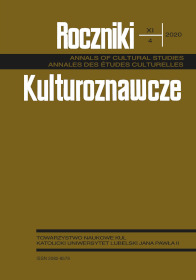From the Old Middle Ages to the New One
Abstract
The main purpose of this article is presentation of chosen aspects which say about functioning of the thought and creation of Hildegard of Bingen in XX and XXI century. Wide interest of this creation is in this article a form of representation of growing tendency of resumption of the long lost spiritual dimension of live. Interest about creation and person of Hildegard started to becoming more popular after the period of philological works which recalled her work. Hildegard’s works became source of inspiration for philologists, philosophers, theologians, artists and musicologists. There are many Companies of Friends of Hildegard which propagate her ideas. In the context of today’s crisis of culture her admonitions to clergy and her ideas of philosophy of man seems very actual. In this sphere idea of Christian humanism is especially important. Current and important are her opinions about scientific research especially about distinction of good and evil knowledge (scientia bona, scientia mala). Also idea of moderation and idea of human to earth relation. This is probably the reason why dietetics and medicine of her are so popular in this days. Thanks to that, Hildegard of Bingen from old middle ages enters into new middle ages which perhaps will come to be.
References
Alanus ab Insulis [Alan z Lille]. De planctu naturae. PL 210, kol. 51-110. Także: Liber de planctu naturae. http://www.thelatinlibrary.com/alanus/alanus1.html. Przekład angielski: The Complaint of Nature. https://sourcebooks.fordham.edu/basis/alain-deplanctu.asp.
Balter, Lucjan. Atanazjański symbol wiary. W: Encyklopedia katolicka, t. 1, kol. 1025. Lublin: Towarzystwo Naukowe KUL, 1973.
Bierdiajew, Mikołaj. Nowe Średniowiecze, tłum. Marian Reutt, Meandry kultury (Kraków: Wydawnictwo Vis-à-vis Etiuda, 2019; przedruk za wydaniem: Poznań: Towarzystwo Wydawnicze „Głosy”, 1936).
Kowalewska, Małgorzata. „Związek etyki i medycyny w koncepcji Hildegardy z Bingen”. W: Humanizm a medycyna, red. Alina Bernadetta Jagiełłowicz, 81–97. Wrocław: Wydawnictwo Naukowe Oficyna Wydawnicza Arboretum, 2013.
Kowalewska, Małgorzata, Anita Pyrek-Nąckiewicz i Susi Ferfoglia. Ad caelestem Jerusalem perducando. Kraków: Uniwersytet Papieski Jana Pawła II, 2020.
Lewis, C[live] S[taples]. „O muzyce kościelnej”. W: Rozważania o chrześcijaństwie. Tłum. Zbigniew Kościuk. Warszawa: Logos, 2020.
Mechtylda z Magdeburga. Strumień światła Boskości. Tłum. Polikarp Jan Nowak. Źródła monastyczne 31. Kraków: Wydawnictwo Benedyktynów Tyniec, 2004.
Scruton, Roger. Zielona filozofia. Jak poważnie myśleć o naszej planecie. Tłum. Justyna Grzegorczyk i Rafał P. Wierzchosławski. Poznań: Zysk i S-ka, 2017.
Scruton, Roger. Muzyka jest ważna. Tłum. i red. Katarzyna Marczak, Kraków: Fundacja InCanto, 2020.
Wilhelm z Lorris i Jan z Meun. Powieść o róży. Wybór, przekład ze starofrancuskiego i wstęp Małgorzata Frankowska-Terlecka i Teresa Giermak-Zielińska. Bibliotheca mundi. Warszawa: Państwowy Instytut Wydawniczy, 1997. Oryg. Le roman de la rose par Guillaume de Lorris et Jean de Meung. Édition accompagnée d’une traduction en vers. Précédée d’une Introduction, notices historiques et critiques; suivie de Notes et d’un Glossaire par Pierre Marteau. T. I. Paris, 1878. Project Gutenberg. http://www.gutenberg.org/ebooks/16816.





